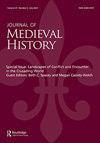书面斯拉夫语的出现(公元860 - 880年):地点和原因?
IF 0.3
2区 历史学
0 MEDIEVAL & RENAISSANCE STUDIES
引用次数: 0
摘要
斯拉夫语是九世纪或十世纪初最早出现的语言之一。拉茨公爵(846-70)和斯瓦托普鲁克公爵(870-94)的摩拉维亚王国,在圣君士坦丁-西里尔和梅多迪乌斯传教活动的框架内,通常被认为是这一倡议的背景。然而,这个命题仅仅是基于圣徒的语料库,这两个圣人和这些文本的价值似乎特别弱。因此,即使斯拉夫文本在摩拉维亚流传,它们也不太可能是这种语言创新中最古老的步骤。因此,有必要回顾这些来源,以便将书面斯拉夫语的诞生置于背景下;然后可以提出新的解释来解释这种新颖性及其成功。本文章由计算机程序翻译,如有差异,请以英文原文为准。
The emergence of written Slavonic (c.860–c.880): where and why?
ABSTRACT Slavonic is one of the languages that was first written in the ninth century, or perhaps at the beginning of the tenth. The Moravian kingdom of Dukes Ratiz (846–70) and Svatopluk (870–94), within the framework of the missionary activities of Sts Constantine-Cyril and Methodius, is generally proposed as the context for this initiative. However, this proposition is based only on the hagiographic corpus which concerns those two saints and the value of these texts seems particularly weak. As a result, even if Slavic texts were circulating in Moravia, it is unlikely that they were the oldest steps in this linguistic innovation. It is therefore necessary to review the sources in order to contextualise the birth of the written Slavonic language; then new interpretations can be put forward to explain this novelty and its success.
求助全文
通过发布文献求助,成功后即可免费获取论文全文。
去求助
来源期刊

JOURNAL OF MEDIEVAL HISTORY
MEDIEVAL & RENAISSANCE STUDIES-
CiteScore
0.60
自引率
0.00%
发文量
29
期刊介绍:
The Journal of Medieval History aims at meeting the need for a major international publication devoted to all aspects of the history of Europe in the Middle Ages. Each issue comprises around four or five articles on European history, including Britain and Ireland, between the fall of Rome and the Renaissance. The Journal also includes review articles, historiographical essays and state of research studies.
 求助内容:
求助内容: 应助结果提醒方式:
应助结果提醒方式:


